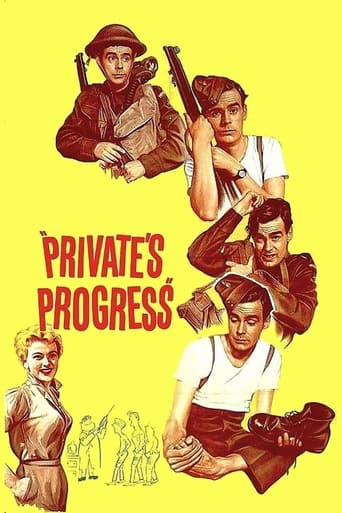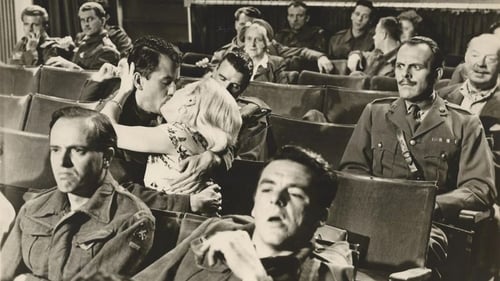Martin Bradley
"Private's Progress" was the first of the Boulting Brothers' anti-establishment satires, (this time it was the army getting it), and over the years it has built up something of a reputation. It's also very funny, (more 'Private Eye' than 'Punch'), and much more cynical than other British comedies of the time. It introduced us to Ian Carmichael's character Stanley Windrush, the perpetual innocent abroad in a world of charlatans and n'er-do-wells beautifully represented by the likes of Richard Attenborough, Dennis Price and, best of all, the great Terry-Thomas. They are all great company and other familiar faces in the cast include Ian Bannen, William Hartnell, Kenneth Griffith and Christopher Lee. It would take the Americans several years to catch up.
paul-743-899114
This film is very underrated and rarely shown on TV.The premise is simple, and there's nothing wrong with that, especially when it's so funny. Everything about it is as British as fish and chips, so Americans may not appreciate it as much as us, Australians and Kiwis, etc.The direction, editing, script and acting are spot on. The Boulting Brothers followed this one up with "I'm All Right Jack.", using nearly the entire same cast (playing the same characters), plus Peter Sellers, which was a master stroke. I reckon this is just as good as IARJ. There isn't a dull moment, and it's worth seeing for Terry Thomas and Dennis Price alone. No one says Terry's lines like him, and no one does wily like Price.What a shower!
bob the moo
Before WWII the British workforce were made up of the military, agricultural workers, industrial workers and millions of civil servants to organise everything. With WWII the military grows in the UK to the largest it has ever been. As part of the draft, the upper class Stanley Windrush finds himself called out of his university education to join the war effort. After failing the officer's training, he finds himself down among the working classes.Despite the fact that this film has a very loose plot until the final third, this is still a great little comedy that will appeal to those of us who are familiar with British society and all it's general groups. The plot sees an educated person fall into the ranks of the workingmen before being sent on a mission to steal a collection of priceless art from inside Germany. All of this is OK and the majority of the film is spent on Windrush's training but in reality I see the plot as just an effective framework for lots of sharp observations that, although rarely laugh-out-loud funny, are still very funny. Nobody gets away unscathed and the type of humour is obvious from a pre-credit sequence that mocks the number of civil servants and a title sequence that pointedly thanks nobody official for their help! The script has spot-on digs at the educated classes, the scheming and work-shy working classes, the foolish officer classes as well as the whole general culture of the UK. You would think that the film would have dated, but it's observations on British society are still pretty accurate (even if they are sweeping generalisations). For this reason I found it funny and the plot manages to pull off the dual trick of being enough to keep the film moving and giving it a narrative but also not intruding into the humour of the film.The cast is surprisingly deep in good performances, spot on caricature and a load of famous faces doing just what they are famous for! Carmichael leads the cast really well and has an enjoyable role as a bit of a limp fellow (educated, you know!). He is supported by the likes of Attenborough as a bit of a dodger and a raft of good performances from the likes of Malleson, Jones, Maddern, Hartnell and Trubshawe. These are added to by the typically wonderful Terry-Thomas ('you're an absolute shower, the lot of you') and Le Mesurier doing their usual (but always appreciated) stuff. Also of note is a small, early role for one Christopher Lee as an English-speaking German aide towards the end of the film. All the cast do really well but it is a spot-on script that makes their work look so effortless.Overall this is not a hilarious comedy in the modern style but more a consistent gentle wit that, sadly, may leave modern audiences wondering why it is so loved. However those of us aware of the society that the film is digging at will be more than amused by this film. Plot may well come second to humour and satirical digs but it is still strong enough to make the film work without taking anything away from the sharp script.
Alice Liddel
The comedies of the Boulting Brothers may not have dated very well. It is hard to believe that 'Private's Progress' was released only three years before 'Some Like It Hot', because while Wilder's films seems fresher and more modern with each passing year, ever renewable and adaptable, big enough to hold the latest theory or fad, 'Progress' is a dinosaur, stone dead, trapped inside a mindset only Anne Widdicombe would recognise, unable to transcend its time or ideology by cinematic invention, comedic originality, or subversive ideas.Furthermore, many Boultings' comedies, such as 'I'm Alright Jack' and 'Carlton-Browne of the FO' are virtually indistinguishable, sticking an upper-class ass into an 'alien' environment, be it of class, profession, modernisation, and watch him make an upper-class ass of himself.
Actually, this is a little unfair on the Boultings - one can see what they're doing. Usually embodied by the sublimely silly Ian Carmichael, this character is a receptacle of a certain kind of English ideal, someone fundamentally decent, loyal, complacent, absent-minded, a good egg, cricket-playing sort of chap, a person so removed from the actuality of real life, that when he is actually thrown into this modern inferno, where his values are so much empty posturing, he is hopelessly out of his depth, a figure of fun, to be used and abused by the new aristocracy, the cads, entrepeneurs, go-getters, women; crooks one and all. But he's not some sort of naive Holy Fool in a world of devils; he is dangerous, and his practical paralysis enables the devils to thrive, as happens in 'Progress', with a plot so blithely horrifying, you have to pay attention to be shocked.Because, even though moments of laugh-out laughter are sparse (there are a few, eg Stanley's drunken scene), this is a thoroughly enjoyable film. This enjoyment comes largely from the Brothers' cynicism, by trotting out out the same old reliable faces you get in every British comedy of the period, aware that the mere sight of them will guarantee a fond chuckle and immediate pleasure. And dammit if they're not right.They're all here - Carmichael, so good-naturedly inept, you can't help warming to him; the godlike Terry-Thomas, less a lecher here than usual as the bored major who slips off to the cinema or pub, although he does listen eagerly to tales of his unit's priapic effect on the local females - his 'you're all absolute showers' will never pall; Dennis Price, another glorious study in polished evil to rank with 'Kind Hearts and Coronets', as ruthlessly efficient as the Nazis as he profits from fleeing Jews (in many ways, this is a much more successful take on the world of 'Catch-22' than Nichols' film); Richard Attenborough, whose greatness as an actor is in inverse proportion to his talents as a director, wonderful here as the sly cockney to watch (as with 'The League of Gentlemen', it's a great shame that British cinema at the time was so censorious); John le Mesurier, who needs only to open up his mouth to suggest barely concealed aghastness (sic?).The film starts well, with the timeless arcadia of Oxbridge contrasted with the destructive horror of the war situation. The Boultings' comedy is pretty much formulaic, a series of character sketches giving on to an implausible, though enjoyable plot. As is advisable in comedies, Boulting shoots in a restrained, unobtrusive style, never flat, sometimes straining for the picturesque, but sometimes, with a sharp camera movement, achieving a superb effect, such as the queue outside the medical tent where Stanley stands, a bit 'fragile'; the white pillars looking frighteningly like the unmarked military graves you find dotting France.




